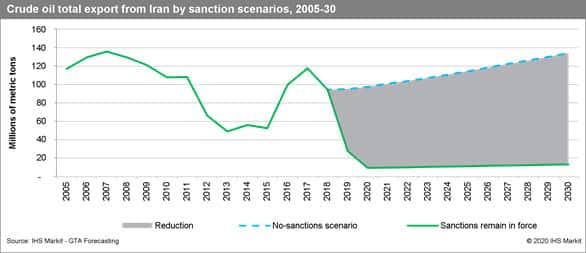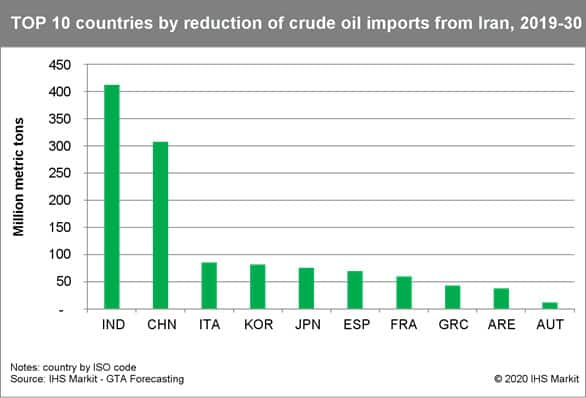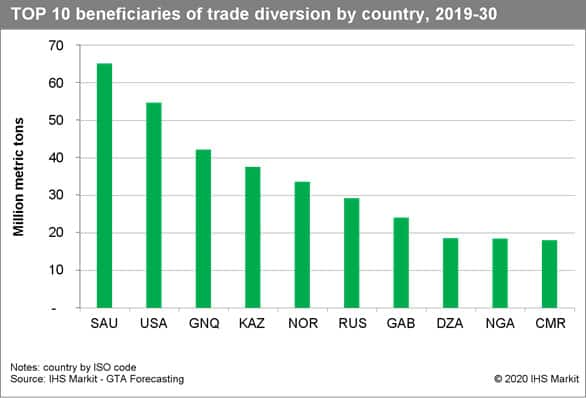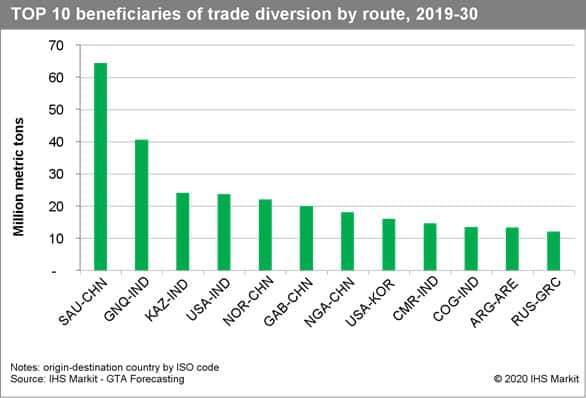Customer Logins
Obtain the data you need to make the most informed decisions by accessing our extensive portfolio of information, analytics, and expertise. Sign in to the product or service center of your choice.
Customer Logins
BLOG
Mar 30, 2020
Sanctions against Iran: the long-term effects on international crude oil trades
Key points:
- US sanctions have led to sharp declines in Iran's crude oil exports
- If the sanctions against Iran remain unchanged, Iran is expected to lose its revenues resulting from the reduction of crude oil exports by 1.210 million metric tons (approximately $613.1 billion, at 2018 prices) by the end of 2030
- Trade rerouting from Iran to other countries is observed, although the compensation of Iranian crude oil imports is relatively low and estimated at 12.2% in 2019
- The restrictions on imports from Iran have hit mainland China and India most; both were responsible for 58.4% of total Iranian crude oil exports in terms of volume in 2018
- We predict that the highest possible benefits in the long run, as a result of the trade rerouting, will benefit two countries — Saudi Arabia and the United States
Impact on Iran exports
World trade in crude oil amounted to 2.224 billion metric tons (44.7 million barrels per day) in 2018. Iran was the ninth-largest country in global crude oil exports with a share of 4.2% in terms of volume in 2018. The sanctions re-imposed by the United States in 2018 and 2019 on Iranian oil imports have resulted in a sharp drop in Iran's oil sales last year. We estimate that Iran has reduced its revenues from oil sales from $47.862 billion in 2018 to $14.157 billion in 2019 (at 2018 constant prices).

Based on crude oil monthly data provided by IHS Markit Global Trade Atlas, after May 2019, when Iranian crude oil was supposed to be completely prohibited from imports, it was still imported by two countries: mainland China (regularly) and the Netherlands. Therefore, despite the sanctions imposed on the imports from Iran being in force, we expect the Chinese imports to be maintained in 2020 and beyond.

China (mainland) and India are the countries that have the most reduced crude oil imports from Iran compared with the no-sanctions scenario.
If the sanctions remain in force — the escalation of the US-Iran conflict at the beginning of the year indicates this — the total loss of revenues from Iran's crude oil sales will be about $613.1 billion*, which corresponds to a total fall in volume by 1.210 million metric tons (down 2.0 MMb/d on average) over the period 2019-30.
Offset the reduction in Iranian crude oil exports
We further observe some crude oil trade rerouting from Iran to other countries. Due to the existing trade relationships, we expect the largest beneficiaries to be those countries that have increased supply of crude oil to Iran's trade partners after the sanctions were imposed. Based on the monthly IHS Markit Global Trade Atlas data, we estimate the compensation factor (balancing imports from Iran with crude oil supplies from other countries) was, on average, 12.2% in terms of volume in 2019 for Iran's trade partners.

Saudi Arabia and the United States can benefit the most from the trade re-allocation. These two countries are predicted to be responsible for one-fourth (with a share of 24.9%) of the total crude oil imports compensation from Iran in volume terms through 2030.

Brief background on sanctions
The United States sanctions recently imposed on Iranian crude oil exports were introduced in two waves. The first wave in November 2018, when imports of oil from Iran were banned, with some temporary exemptions granted to countries such as China, India, Italy, Greece, Japan, South Korea, Taiwan, and Turkey, to ensure a well-supplied oil market. The second wave in May 2019, when the sanctions against Iran were tightened and the ban on Iranian crude oil imports was introduced for all countries without any exemptions.
To learn more read the full article on IHS Markit Connect
(Please note you need a Connect subscription)
Notes:
The forecasts do not take into account the impact of the problems in negotiations with OPEC, the coronavirus disease 2019 (COVID-19) effect on the world economy, as well as the upcoming presidential elections in the United States in late 2020.
Predictions are between 2019 and 2030.
*Values at constant trade unit values (export/import prices) for
2018.
Barrel per day unit (b/d) is converted from metric tons: 1 b/d = 1
metric ton * 7.33 / 365 days.
Source: IHS Markit - GTA Forecasting & Global Trade Atlas.
Posted by Bartosz Krapinski, Senior Economist II, IHS Markit Maritime & Trade
{"items" : [
{"name":"share","enabled":true,"desc":"<strong>Share</strong>","mobdesc":"Share","options":[ {"name":"facebook","url":"https://www.facebook.com/sharer.php?u=http%3a%2f%2fstage.www.spglobal.com%2fcommodityinsights%2fen%2fci%2fresearch-analysis%2fsanctions-against-iran-the-longterm-effects-on-crude-oil-trades.html","enabled":true},{"name":"twitter","url":"https://twitter.com/intent/tweet?url=http%3a%2f%2fstage.www.spglobal.com%2fcommodityinsights%2fen%2fci%2fresearch-analysis%2fsanctions-against-iran-the-longterm-effects-on-crude-oil-trades.html&text=Sanctions+against+Iran%3a+the+long-term+effects+on+international+crude+oil+trades+%7c+S%26P+Global+","enabled":true},{"name":"linkedin","url":"https://www.linkedin.com/sharing/share-offsite/?url=http%3a%2f%2fstage.www.spglobal.com%2fcommodityinsights%2fen%2fci%2fresearch-analysis%2fsanctions-against-iran-the-longterm-effects-on-crude-oil-trades.html","enabled":true},{"name":"email","url":"?subject=Sanctions against Iran: the long-term effects on international crude oil trades | S&P Global &body=http%3a%2f%2fstage.www.spglobal.com%2fcommodityinsights%2fen%2fci%2fresearch-analysis%2fsanctions-against-iran-the-longterm-effects-on-crude-oil-trades.html","enabled":true},{"name":"whatsapp","url":"https://api.whatsapp.com/send?text=Sanctions+against+Iran%3a+the+long-term+effects+on+international+crude+oil+trades+%7c+S%26P+Global+ http%3a%2f%2fstage.www.spglobal.com%2fcommodityinsights%2fen%2fci%2fresearch-analysis%2fsanctions-against-iran-the-longterm-effects-on-crude-oil-trades.html","enabled":true}]}, {"name":"rtt","enabled":true,"mobdesc":"Top"}
]}

